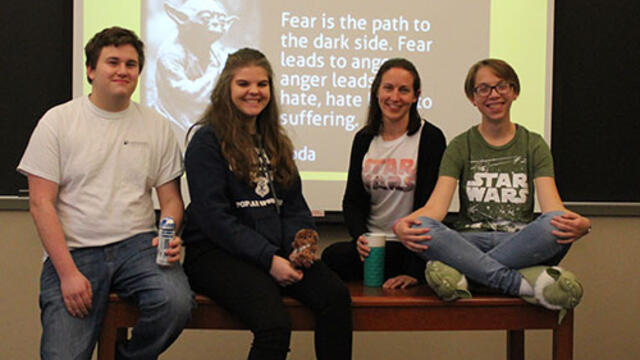The Force is with first-year students probing the psychology of ‘Star Wars’
Professor Holly Chalk’s First Year Seminar (FYS) students are beginning to see that iconic villain Darth Vader in the light of a different star as they explore “The Psychology of ‘Star Wars’” and uncover the roots of Vader’s probable anxiety disorder.

Professor Holly Chalk’s First Year Seminar (FYS) students are beginning to see that iconic villain Darth Vader in the light of a different star as they explore “The Psychology of ‘Star Wars’” and uncover the roots of Vader’s probable anxiety disorder. Will Lampert of Westfield, N.J.; Jenna Barth of Mt. Airy, Md.; Psychology professor Holly Chalk and Emily Renfro of Columbia, Md., share “Star Wars” memorabilia after their “Psychology of ‘Star Wars’” FYS class.
Professor Holly Chalk’s First Year Seminar (FYS) students are beginning to see that iconic villain Darth Vader in the light of a different star as they explore “The Psychology of ‘Star Wars’” and uncover the roots of Vader’s probable anxiety disorder.
“With the new films coming out in 2015 and this year, I knew that ‘Star Wars’ would be a popular topic right now,” she says of George Lucas’ epic film series. “There are also so many excellent applications of psychology in the films, including psychological disorders, psychopathy, archetypes, social influence and persuasion, gender dynamics and much more.”
Aha moments punctuate each class as Chalk’s first-year students find connections between the psychology they are learning and the vivid characters and events in the films they love. Among her 17 FYS students are both longtime and relatively recent “Star Wars” fans.
Interested more in fantasy than science fiction in middle and high school, Emily Renfro of Columbia, Md., just started watching “Star Wars” in the past year or two.
“I love this class — it’s a lot of fun because the psychology is interesting and to be able to apply it to ‘Star Wars’ is fantastic,” says Renfro, sporting a Darth Vader T-shirt, Chewbacca flashlight and serene green Yoda slippers. “It’s easier to understand the psychology when you can apply it to a ‘Star Wars’ character instead of a real person.”
During a recent class, Chalk led her students through the topic of anxiety disorders where much of the discussion centered on Darth Vader and the Jedi, Anakin Skywalker, he was before turning to the Dark Side. Chalk asked her students if they thought his evil came from a place of fear — fear of losing the people he loved, fear of not being able to control, fear of not being powerful enough.
Their nods and focused attention reflecting their understanding, the students named other characters, noting they too seemed to exhibit signs of an anxiety disorder. The metallic-gold droid C-3PO surely suffered from generalized free-floating anxiety that moves typically and relentlessly from one worry to another. And even Luke Skywalker, unlike other Jedi, seemed to have more than his share of anxiety.
As an FYS, Chalk’s course encompasses more than the psychological principles she’s covering. Her goals for her students are to understand various psychological principles and the ability to apply them to novel situations as well as to critically evaluate an argument, to write clearly, concisely and objectively; to learn how to identify, obtain, and analyze primary sources within psychology and to effectively construct and deliver an oral presentation.
“‘Star Wars’ is the fun and engaging topic that we use to learn these universally applicable skills,” says Chalk who enjoyed the films in high school and college but really became a fan when she introduced her then 5-year-old twins to the films in 2015. “It was great to watch the older films through a child’s eyes. It definitely renewed my excitement for the films.”
First-year student Jared Houck of Lancaster, Pa., can’t remember not being a fan of “Star Wars,” since he’s been watching the films since he was in first or second grade.
“This class is awesome — it’s my favorite class,” says Houck, who plans to major in Kinesiology. “I’ve never taken a psychology course before and it’s really interesting, but being able to apply everything to ‘Star Wars’ makes it even better.”
Houck’s classmates echo his assessment while proving Chalk’s prediction to be true: “Star Wars” holds her students’ attention and actually helps them understand psychology.
“I find ‘Star Wars’ so engaging because of the universal themes of heroism, anger, fear, love,” she says. “Many psychology topics are depicted in the films and I particularly like the most recent film, ‘The Force Awakens’, in which a strong female lead carries the film.”